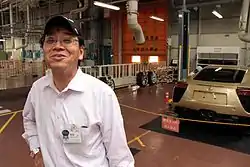Haruhiko Tanahashi | |
|---|---|
 Tanahashi holds pages of the LFA development diary | |
| Nationality | Japanese |
| Occupation | Engineer |
| Engineering career | |
| Discipline | Mechanical engineering |
| Employer(s) | Toyota Motor Corporation |
| Projects | P280 program |
| Significant design | Lexus LFA |
Haruhiko Tanahashi (棚橋晴彦, Haruhiko Tanahashi) is a Japanese automotive engineer who is responsible for the design and construction of the Lexus LFA supercar. Tanahashi joined Toyota Motor Corporation in 1978 as a chassis engineer, and has since worked in new vehicle design for over 30 years.[1] The LFA development program, begun as project 680,[2] comprised over a decade of his career until the debut of the vehicle in 2009.[3] Tanahashi holds eight automotive design patents,[4] previously worked on earlier models including the Toyota Crown, Soarer and Aristo, and has been part of various Toyota and Lexus development divisions.[1]
Career
Tanahashi was hired by Toyota Motor Corporation in 1978, whereupon he was first assigned to the Chassis Engineering Division.[1] There, he worked as a suspension engineer on vehicles such as the rear wheel drive Toyota Mark II, Crown, Soarer, and Aristo, along with the front wheel drive Toyota Corona, Corolla, and Celica.[1] In December 1982 Tanahashi filed for his first U.S. patent, regarding the "upper support structure for front wheel suspension of automobile", which was granted in 1984.[4] His work on the first generation Soarer included a patent for the vehicle's "electronic modulated air suspension";[4] other inventions included a "rack and pinion type steering gear device"[5] and "twin-tube type shock absorber".[6]
In 1992, Tanahashi was transferred to Toyota's Body Engineering Division, where he worked on passenger vehicle suspension architecture, and in 1995 he moved to Development Department 1 of the company's Advanced Vehicle Planning Division to oversee development of new vehicles, platforms, and technologies.[1]
Chief engineer

In 2000, Lexus had begun project P280, which intended to create a supercar concept which would showcase 200-mph performance capabilities.[7] In 2001, Tanahashi was promoted to the Lexus Development Center's newly founded Z department, where he was placed in charge of LFA development.[1] The supercar design program opted for a front mid-engine configuration, an approach Tanahashi favored for its combination of dynamics and safety.[3] The vehicle development process was unprecedented in the company's history, exceeding the previous Toyota Supra in performance class, and requiring new engine, cooling, clutch technologies.[3]
Tanahashi's stated goal with the LFA was to produce "ultimate driving pleasure".[3] At the culmination of the development process, Tanahashi remarked in an interview that he was most proud of the car's engine sound, its engine response, and handling.[3] Following the completion of the LFA design program, Tanahashi remained at his current position within the Lexus Development Center.[1]
References
- 1 2 3 4 5 6 7 "Chief Engineer Haruhiko Tanahashi" (PDF). Toyota.co.jp. Retrieved 2010-01-03.
- ↑ Bertel Schmitt (2012-07-11). "The Making Of The Lexus LFA Supercar. An Inside Report, Chapter 3: Call Me Names". The Truth about Cars. Retrieved 2015-01-28.
- 1 2 3 4 5 "Questions with Haruhiko Tanahashi - We talk with the Lexus LFA Chief Engineer". Road & Track Magazine. Archived from the original on 2012-04-03. Retrieved 2009-10-22.
- 1 2 3 "Tanahashi Haruhiko, Inventor, Toyota, JP". Retrieved 2010-01-04.
- ↑ "Rack and pinion type steering gear device - Patent 4593578". Retrieved 2010-01-04.
- ↑ "Twin-tube type shock absorber patent". Patentlens.net. Retrieved 2010-01-04.
- ↑ "2007 Lexus Lf-A - First Look". Motor Trend. Archived from the original on 2009-10-28. Retrieved 2009-09-09.